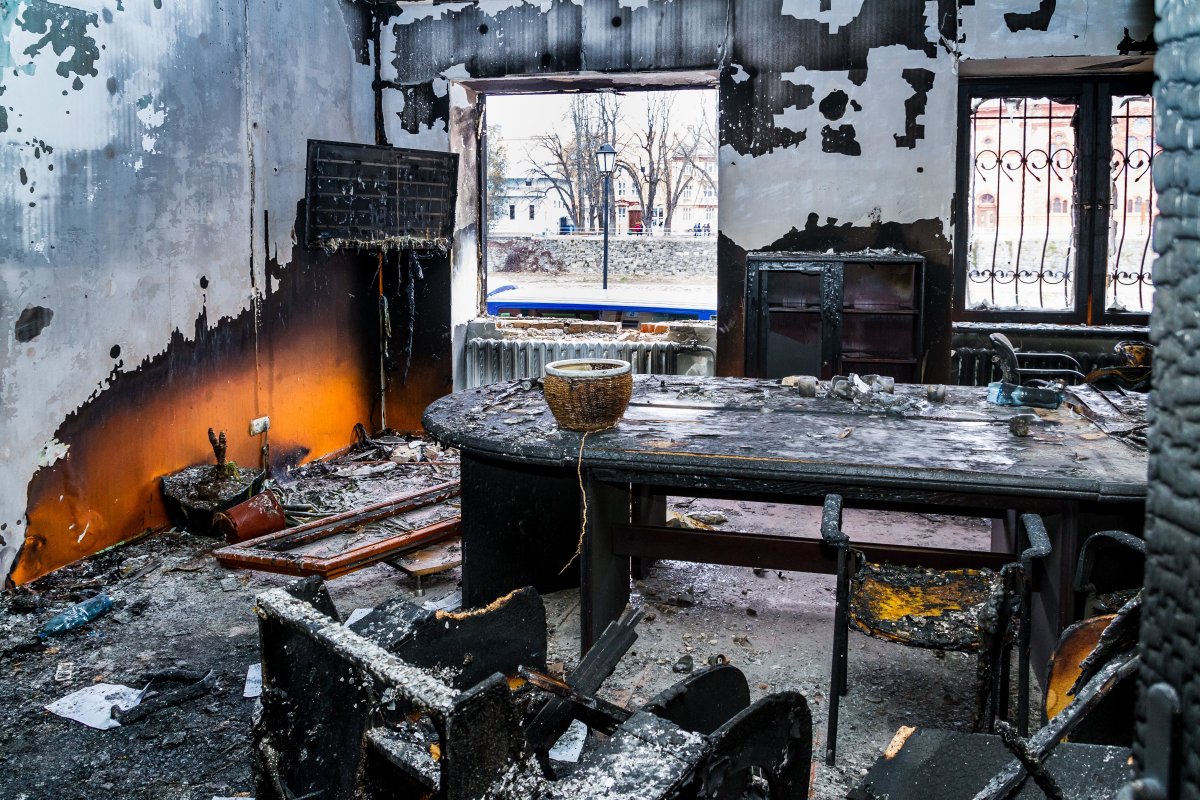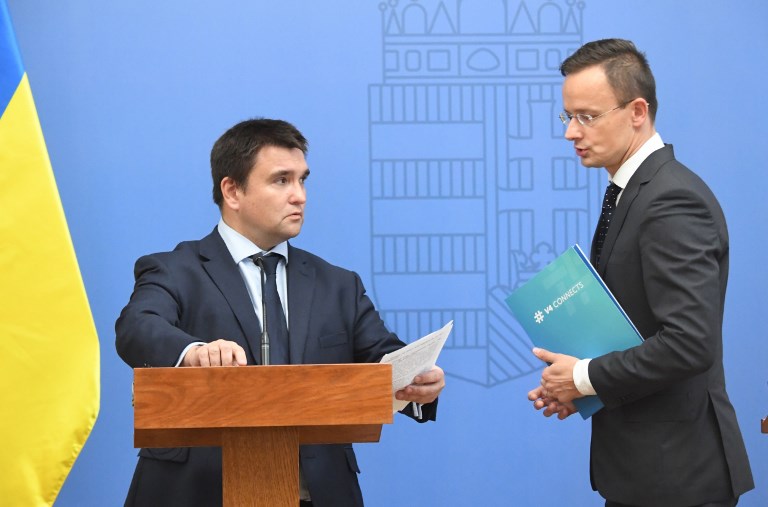At first blush, it appeared to be a hate crime against Hungarians in Ukraine’s far western Zakarpattia Oblast: not one, but two separate arson attacks on a Hungarian cultural center in Uzhgorod occurred within weeks of one another.
The firebombings came at a time of heightened local and international tension over a new Ukrainian education law that would significantly limit teaching in minority languages.
However, according to the authorities, the arson attacks were not a flare-up of ethnic tensions. Rather, they were a Russian-led, cross-border provocation featuring the Polish far right, Ukrainian military hirelings and one organizer from Moldova’s Transnistria frozen conflict zone.
Now, Ukraine has arrested two people in connection with the crime, which was reclassified as a terrorist attack. Poland has also arrested two suspects. But much about the attacks and their organizers remains unclear.
Arson
In the early morning hours of Feb. 4, unknown assailants hurled a Molotov cocktail at the window of the Zakarpattia Society of Hungarian Culture, located in an historic house just 10 meters from the Hungarian Consulate. The bottle broke through the window’s first layer of glass, and only the window frame burned.
In the ensuing weeks, Zakarpattia Oblast Governor Hennady Moskal and his administration identified the attackers as Adrian Marglewski, 22, and Tomasz Rafal Szymkowiak, 25, members of the Polish far-right organization Falanga. After allegedly carrying out the attack, they crossed the border into Slovakia, Moskal said.
Then, on Feb. 27, an attacker struck the cultural center again, destroying three rooms of the building.
“You cannot consider the second incident arson, because the attackers used a bomb with TNT and there was an explosion,” says László Brenzovics, a Ukrainian member of parliament of Hungarian descent and the cultural center’s chairperson.

The office of the Zakarpattia Society of Hungarian Culture in Uzhgorod damaged by an arson attack on Feb. 27, 2018 (Nemesh Yanosh/ UNIAN) (source)
That same day, Poland’s Internal Security Agency detained Marglewski and Szymkowiak, as well as a third man, identified in the media only as Michal P. The two suspects were placed under three-month arrest, while Michal P. was released under police supervision.
On March 4, National Police Chief Serhiy Kniazev announced that suspects in Feb. 27 attack had been detained in Ukraine. Two days later, two men — Oleksandr Biloborodko, 42, and Volodymyr Kondratenko, 54 — were arrested by an Uzhgorod court for two months without bail.
According to the governor Moskal, both had served in the Ukrainian army fighting in the Donbas. “They are not members of political parties or movements, but were tempted with money to carry out this provocation,” he wrote on Facebook.
A man who shares a name with Biloborodko is listed as a major of Ukrainian Armed Forces who received an award for courage in November 2014.
Moskal also announced that the authorities had identified the attack’s organizer: an employee of the “State Security Ministry” of Transnistria, who escaped back to the unrecognized, Russia-backed “republic” in Moldova.
In court, Kondratenko said that he and Biloborodko served together in the Donbas and travelled to Zakarpattia to celebrate a comrade’s retirement from the military. However, Kondratenko claimed that he became ill during the festivities and had to seek medical attention. After taking medicine, he fell asleep and did not wake up until he and his friend had left the region.
International conspiracy
The Ukrainian authorities allege the attacks were orchestrated by Russia in order to destabilize one of Ukraine’s most diverse regions and damage the country’s relations with its Western neighbors.
Brenzovics of the Hungarian Culture Society believes that both attacks aimed to incite inter-ethnic hatred. Last year, Ukraine passed a new education law that requires virtually all education beyond the fourth grade be taught in Ukrainian starting from September 2018. Public schools will still be allowed to teach some classes in minority languages, including Hungarian.
The law sparked an outcry from minority communities and some neighboring countries, who claim it infringes upon the right of ethnic minorities to speak their native languages.
Hungarians — who are estimated to make up 0.3 percent of Ukraine’s population — have been the most vocal opponents of the law. Hungarian Prime Minister Viktor Orban’s government even threatened to block Ukraine’s further integration with the EU and NATO as long as the law remains in force.

Ukraine’s Foreign Minister Pavlo Klimkin (L) and Hungary’s Minister of Foreign Affairs and Trade Péter Szijjártó (R) at a joint press conference in Budapest on Oct. 12, 2017 (AFP)
But Brenzovics believes that a large-scale anti-Hungarian campaign in Ukrainian media prepared the ground for the attacks. “The campaign started long before the law on education was adopted. Our community was accused of separatism, of speaking predominantly Hungarian, of having double citizenship,” Brenzovics told the Kyiv Post.
Amid such tensions, an attack on a Hungarian center could prove particularly divisive. Anton Shekhovtsov, an expert on the far right and a visiting fellow at the Institute for Human Sciences in Vienna, Austria, believes that the attack resembles other false flag operations intended to spark conflict between Ukraine and its neighbors and damage Kyiv’s reputation.
The alleged involvement of Poland’s Falanga movement also fits into the Ukrainian authorities’ claims of Russian involvement. Shekhovtsov notes that Falanga is known for its pro-Kremlin positions and some of is members even traveled to eastern Ukraine in support of the self-proclaimed “Donetsk and Luhansk People’s Republics” in 2014.
The second attack, he says, was likely organized after the first failed to garner the necessary attention.
“For this sort of operation, the media coverage is important,” Shekhovtsov said. “The more noise in the media, the more successful these provocations are.”
Not everyone agrees with the Ukrainian authorities’ official explanation. Bartosz Bekier, the leader of Falanga, confirmed that the two Polish arrestees worked on XPortal.pl, his organization’s website. But he says they will be expelled from the movement if their involvement is proven.
“Falanga has no interest in attacking Hungarian brothers in any country in the world, including their homeland in Zakarpattia,” he told the Kyiv Post in an emailed comment. “This is obvious for everyone who knows our political program and history of Polish-Hungarian friendship.”
Bekier also denied involvement in anti-Ukrainian activities and called the allegations “Ukraine’s information war against Polish patriots.”
Mission accomplished
In the wake of the second attack, Moskal and the Hungarian cultural center issued a joint statement: “[T]hese provocations have not had and will not have any success. They will only unite Ukrainians and Hungarians, and also representatives of other nationalities living in Zakarpattia.”
Reality, however, is a bit more complicated. The two attacks appear to have achieved part of their desired effect. Brenzovics says that Uzhgorod’s Hungarian community is experiencing “despair and anger,” and employees of the center resent that law enforcement agencies could not protect them.
“I don’t know what we did to deserve this,” Brenzovics said. “We’re a very small community.”
